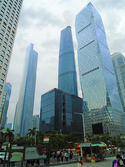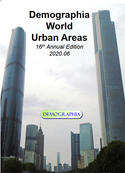Xi’an (pronunciation) is located in central China, on the Wei River, a tributary of the flood-prone Yellow River (Huang He). Xi’an is at the bottom of the “Ordos Loop” (see Surprising Ordos: The Evolving Urban Form), which is formed by the Yellow River’s sharp northward turn upstream at Lanzhou, toward Inner Mongolia (Nei Mongol). read more »
China
Xi'an: Ancient and Modern: The Evolving Urban Form
- Login to post comments
International Hong Kong Banks Embrace Working at Home
In a November 13 article entitled “Hong Kong banks lose appetite for prime space in world’s costliest city as work-from-home becomes permanent after pandemic,” the South China Morning Post (SCMP) reports that some of the strongest financial institutions in Hong Kong are embracing working at home. read more »
- Login to post comments
Hangzhou: The Evolving Urban Form
Hangzhou is the capital of Zhejiang Province in China. Hangzhou’s historic core is located approximately 160 kilometers (100 miles) southwest of Shanghai and approximately 1,100 kilometers (675 miles) from Beijing .It is the largest municipality in Zhejiang, having passed Wenzhou within the last decade. read more »
- Login to post comments
The Real Winners
Progressive ideologues often like to evoke the idea that they speak “truth to power,” but this year it’s their leaders who are consolidating their clout. read more »
- Login to post comments
China and India Rejecting Renewables for Coal-fired Futures
China and India are NOT buying into the global alarm movement. Never in human history have we seen two countries (China and India), each with over a billion people, in need of such gargantuan amounts of energy to keep their economies accelerating and their citizens alive. read more »
- Login to post comments
Chinese Science Fiction's Disaster Dystopias
In Ma Jian’s new novel, the protagonist, Ma Daode, may be a corrupt, womanizing local official, but he is a corrupt, womanizing local official with a mission. His goal is to develop a drug that will allow President Xi Jinping’s vision of a glorious Chinese future to dominate not only citizens’ daily lives but their sleeping hours as well. This is his utopian quest. The China dream, Ma Daode suggests, “is not the selfish, individualist dream chased by Western countries. read more »
- Login to post comments
Slower Municipality Growth in China: 2010-2019
China, which many see as the exemplar of rapid urban growth, is accelerating its own shift towards greater dispersion.
During the 2000s, the largest municipalities (formerly called prefectures) of China grew very quickly. Much of this was a result of an increasing “floating population,” people who moved to the cities from rural areas for employment, especially in factories producing goods for export and in construction. Between 2000 and 2010, according to the China Statistical Yearbook: 2019, the floating read more »
- Login to post comments
Demographia World Urban Areas, 2020: Tokyo Lead Diminishing
For the first time in more than six decades the world’s second ranked built-up urban area has reached within 10% of leader Tokyo. The 2020 edition of Demographia World Urban Areas reports that Jakarta has reached a population of 34.5 million, behind Tokyo-Yokohama’s 38.0 million (Figure 1). The report can be downloaded here (Note 1). read more »
- Login to post comments
Viral Politics
Long after the pandemic has receded, its long-term impact on our society and political life will continue. Just as plagues past have reshaped the trajectory of cities and civilizations, sometimes with fearsome morbidity, COVID-19 is already having a profoundly disruptive impact on our political future. read more »
- Login to post comments
The Coming Age of Dispersion
As of this writing, the long-term effects of the coronavirus pandemic remain uncertain. But one possible consequence is an acceleration of the end of the megacity era. In its place, we may now be witnessing the outlines of a new, and necessary, dispersion of population, not only in the wide open spaces of North America and Australia, but even in the megacities of the developing world. read more »
- Login to post comments






















